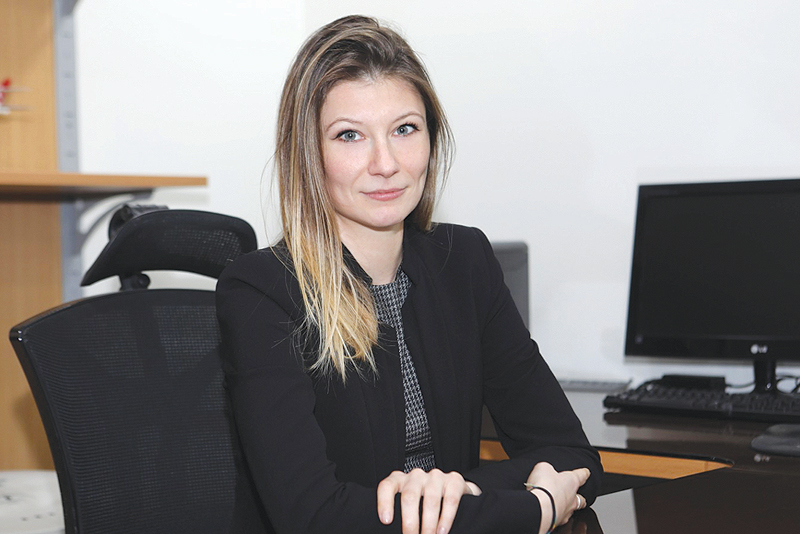KUWAIT: "The Business Year: Kuwait 2019 will show how 2019 is going to be a turning point for the Kuwaiti economy toward the realization of Vision 2035. For this reason, we want to shed the light on sectors like education as a pillar of the future of Kuwait, but also finance, telecoms, and green economy," said Ioana Popa, Country Director, The Business Year. TBY Kuwait is keen on promoting Kuwait and attracting an increasing amount of FDI into the country by showcasing the numerous business opportunities on offer. TBY is also closely working with various business councils, but more specifically with the German Business Council (GBCK), said Popa in an interview.

Question: The Business Year (TBY) is currently working on its fourth edition on Kuwait. What is TBY aiming to do in Kuwait with its yearly publications?
Popa: TBY has operations in 35 countries worldwide and aims to provide the international business community with a comprehensive panorama of each country we analyze through our different platforms. We are an interview-based publication, allowing us to be a privileged B2B platform that gives the chance to CEOs and other leaders to voice their opinions on the main economic trends of the day.
It is also a perfect way to put faces and names to the major sectors of each economy. In order to conduct our research, we always partner with local institutions, therefore sharing their local knowledge and our international expertise. For this reason, we have been collaborating with the Kuwait Direct Investment Promotion Authority (KDIPA) since our first publication on Kuwait back in 2016. For the upcoming 2019 edition, we had the pleasure to renew our partnership and we are happy to work alongside Sheikh Dr. Meshaal Jaber Al-Sabah, Director General of KDIPA, and Mohammed Yaqoub, Assistant Director General for Business Development. Their support is valuable for us and we want to help them promote Kuwait and attract an increasing amount of FDI into the country by showcasing the numerous business opportunities on offer. We also closely work with various business councils, but more specifically with the German Business Council (GBCK).
Q: What does your collaboration with KDIPA entail this year?
Popa: Until now, KDIPA was our research partner and facilitated our access to certain key companies in the country in order for us to conduct our research. For the 2019 edition, we took our partnership one step further. KDIPA and The Business Year Events-the event organization arm of TBY-are co-organizing a one-day event in London on June 13, 2019 at The Dorchester Hotel.
This event will be one of a kind and will include three panels, one on the diversification of the Kuwaiti economy, followed by a discussion about Islamic banking, and finally a panel on the digital economy and entrepreneurship. We will also host Sheikh Dr Meshaal Jaber Al-Sabah, Dr Khaled Mahdi, Secretary General of the Supreme Council for Planning and Development, Bader Nasser Al-Kharafi, Vice Chairman and Group CEO of Zain Group, and numerous other business leaders from the country.
This event will also be the occasion for us to officially launch The Business Year: Kuwait 2019 on stage and for every attendee to receive a copy. The main objective of this event is to increase the exposure of Kuwait at an international level.
Q: What will be the main the main topics of the upcoming The Business Year: Kuwait 2019 publication?
Popa: The Business Year: Kuwait 2019 will show how 2019 is going to be a turning point for the Kuwaiti economy toward the realization of Vision 2035. For this reason, we want to shed the light on sectors like education as a pillar of the future of Kuwait, but also finance, telecoms, and green economy. We also want, through this upcoming publication, to showcase the key role of women in the economy and this is why you will be able to see the interviews of Elham Mahfouz from Al-Tijari, Dr Samira Omar, Director General of KISR and Rana Al-Nibari from The Scientific Center. In addition, we will highlight the increasing role of SMEs and entrepreneurs in the future of the economy.
During our research, we have had the chance to meet with successful young Kuwaitis such as Athbi Al-Enezi from JustClean, Abdullah Al-Mutawa from Carriage, and Mohammed Jaffar, CEO of Faith Capital. We have noticed that Kuwait truly has the potential to become a digital hub in the region if these young entrepreneurial minds keep investing and creating successful tech-related business.
Q: What is your analysis of the Kuwaiti economy in the context of Vision 2035?
Popa: Currently there is a trend in the GCC toward having grand national plans. Kuwait Vision 2035 will be in direct competition with Saudi Vision 2030, Oman Vision 2040, Qatar Vision 2030, and the UAE's vision 2030. Kuwait's political stability and outstanding diplomacy in the region will be among the main competitive factors the country will have to offer. In addition to that, we can add the location of the country, with direct access to the Arabian Gulf, and strong purchasing power. These will be determining factors for foreign investors seeking to invest in the GCC.
However, according to our research, one of the main concerns shared by the business community is the significant bureaucracy and long-lasting processes existing in Kuwait. If not addressed, this concern could negatively impact the realization of Vision 2035. Also, even though the tendering process is fairly transparent and offers, on paper, equality of opportunity to bidding companies, in reality the decisive factor is price. This could be another factor preventing higher levels of FDI in the country and the implementation of high-end companies offering not necessarily the cheapest solutions or services but the most quality.
Kuwait has outstanding potential and could become the place to invest in the GCC. Vision 2035 looks promising and several projects are expected to break ground in 2019, sending a positive message to the international business community but also boosting the level of confidence among investors. If the dialogue remains open between the private and public sectors then there is a great opportunity for Kuwait to become a highly relevant destination for FDI in the near future.










